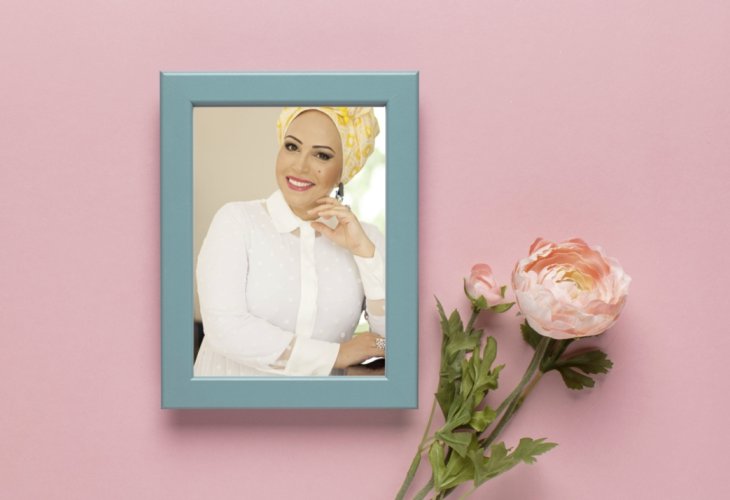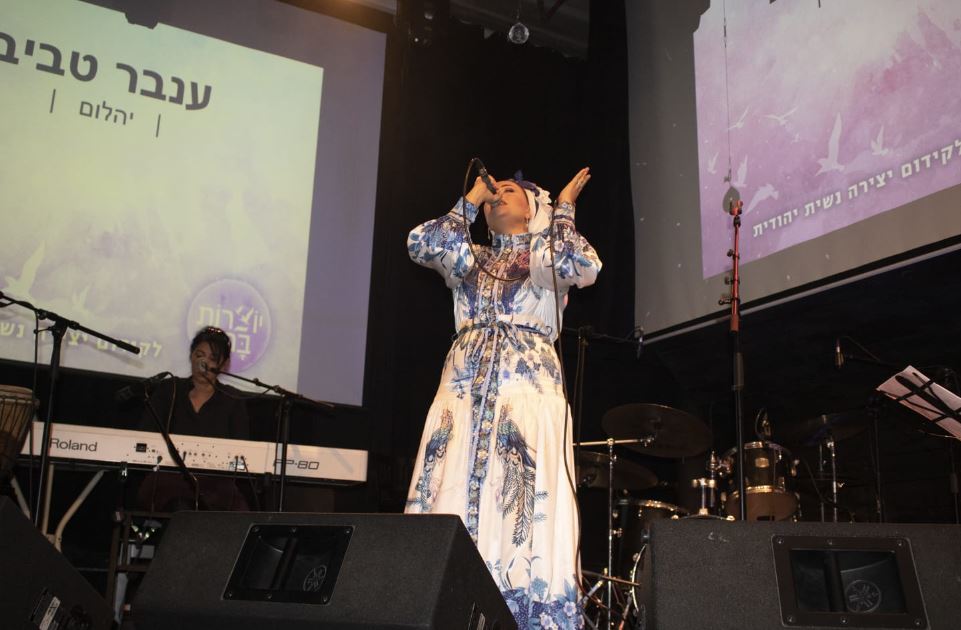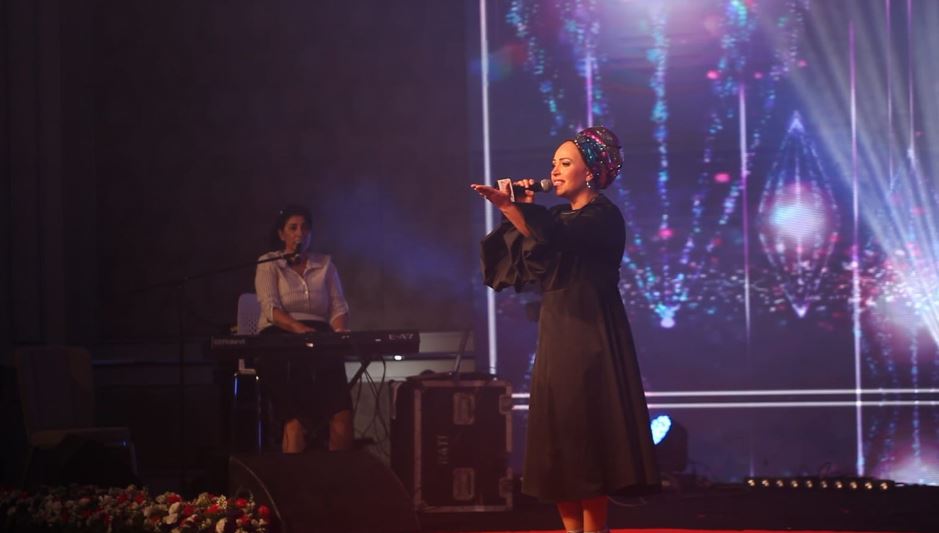Inbar Tabib: 'I Gave Up on Producing an International Album for Hashem'
Inbar Tabib sang on stages for years and performed at numerous events. Just before producing an international album, she learned that her future husband intended to study in a yeshiva, which changed everything. 'I fulfilled my dream, but in a completely unexpected way,' she says.
 (Photo: Einat Hanover)
(Photo: Einat Hanover)Ever since Inbar Tabib was a little girl, she knew she would grow up to become a singer. For her, there was never any doubt. 'I connected with singing, loved to sing, and would sing at every opportunity,' she shares.
She believes she inherited her special talent from her grandfather—Rabbi Saeed Aljamal, her father's father, who was considered one of the greatest poets of Yemen. As a small child, she would visit her grandfather's house, sit by the Shabbat table, and listen to the hymns sung in the unique Yemeni dialect. 'I enjoyed my grandfather's rare voice so much, I think that was when my great love for singing began to pulse within me.'
Inbar talks about her father: 'My father is Prof. Chaim Gamliel, a very famous researcher in the medical field, who dealt less with music, but he was the one who pushed me to fulfill all my dreams. I saw him as a role model because, despite his physical limitations, he never gave up on achieving his professional dreams.'
Child of Songs
When Inbar was five, her parents decided to move to Illinois, USA. 'My father received a special scholarship for studies in the USA, and that's how we found ourselves living there. In fact, my entire childhood was spent abroad. Those were wonderful years. I studied in Chabad institutions with lovely teachers. We were considered a traditional family, but we didn't strictly observe everything. Our home was very open and liberal. My parents saw that I loved singing and dancing, and they really encouraged me to move forward. I was never told there might be a halachic issue.'
Inbar continued to develop in the musical field and advanced at a rapid pace. As a teenager, she mainly performed at local parties and on small stages, already feeling the great satisfaction and joy that singing gave her. 'I would sing in English and Hebrew, trying to imitate the greatest singers, finding myself quickly turning into a real star. I also sang songs in French, a language I knew, and songs with Yemeni roots. I managed to adapt to every audience and style.'
During those days, she had cousins living in Israel who regularly sent her discs with new hits recorded in the country. 'So when I visited Israel, I was invited to perform, and people didn't understand how the singer from the USA knew Israeli songs so well. I felt my future was assured, knowing clearly where I was aiming. I knew I wanted to become a great international singer, performing all over the world.'
Twenty-five years ago, at 18, she immigrated to Israel alone to enlist in the IDF. 'It was important to my family, and I also felt a great honor serving the country,' she explains. 'In the days before my enlistment, I was invited to perform at an event, where I went on stage and sang a song by a very famous singer.'
She sang the song in English, unaware that a music producer from Washington was in the audience, searching for a singer to duet with him on an English song for his upcoming album. 'After the show, he approached me and offered to record the song with him. It was a great honor for me, and just two days later, I found myself in one of the top studios in Tel Aviv recording the duet. The song was later played quite a bit on various radio stations, but luckily, it encountered legal issues and was taken down. Now I understand how much divine assistance was there, as I can't imagine a situation where men hearing me sing without my consent.'
The Dream: An International Album
But for the producer, it was just the beginning. He soon asked Inbar to let him be her manager. Together, they planned the big album they would release and distribute in Israel and abroad.
Meanwhile, Inbar passed the military auditions. 'I really wanted to join an army band, but there was great divine assistance when this was avoided, and Hashem led me to become an officer with a significant and challenging role. In my position, I was responsible for the reserves units, and that's what I did for three years.'
During that time, did you continue to pursue your musical hobby?
'Hardly. I was very busy with my role, but occasionally during breaks, I would meet with my producer, and we would record material for the album. It was our greatest dream, and we were sure we'd achieve it,' Inbar pauses and adds, 'But it wasn't my only dream, because I also very much wanted to become a flight attendant. I realized this dream immediately after finishing the army when I was accepted by El Al.'
How does being a flight attendant fit with the dream of singing?
'My parents taught me that if I enjoy what I do, then I can find time for everything, and that's really how it was back then. I took a flight attendant course while working on the album and performing at various events across the country. In the end, the two things merged because, in my work as a flight attendant, I met very interesting people in the business class, some directly or indirectly involved in the music field. I created connections and advanced myself.'
 Photo: Sapir David Photography
Photo: Sapir David Photography'I Returned Enlightened'
Inbar pauses her story to talk about her personal life: 'During that period, I met another person who changed my life completely. Hashem arranged for me to meet Tomer, who is now my husband. In those days, he wore a kippah that barely showed. From our first meetings, a connection and compatibility formed between us. Both of us felt the relationship was going to be serious. Meanwhile, I continued flying abroad, visiting places like New York, Paris, Canada, South Africa, India, and Thailand.
'One day,' she continues, 'while resting between flights, Tomer contacted me and asked to meet at his parents' house. Naively, I thought he wanted to propose to me or at least advance us in that direction, but I was in for a total surprise. Tomer dropped a bombshell when he informed me that he visited a Jewish seminar and decided he would study in a yeshiva. I saw suitcases and packed bags on his room’s floor, so it was clear he was entirely serious and couldn't change his mind. In fact, he had called me to say goodbye because we both understood that if he continued on the ultra-Orthodox path, I wouldn’t join him, as my path was different.'
How did you feel about the news?
'I took it very hard. I couldn't fathom such a scenario, and it hit me at the most sensitive spot. At the same time, it was clear to me that although I loved Jewish tradition and believed in Hashem, there was no way in the world that my husband would study in a yeshiva. I was as distant from that as the sky from the earth.'
Then one day, Inbar received an unexpected visit. 'Tomer's mother came to me and asked to talk. We spoke openly, and she told me how disappointed she was about the relationship ending, as she and her husband were sure Tomer and I would marry. They themselves were surprised by Tomer's decision to study in yeshiva, yet they respected it. That's how we sat and talked, and somehow she managed to convince me to go to a kiruv seminar. Initially, she didn’t mention that there would be lectures by rabbis, just emphasizing the hotel, the stunning view, meals, and the relaxation. After I told her it suited me perfectly, she revealed there were also lectures, but by then it was too late. That’s how I ended up at the seminar.'
Like many others experiencing a spiritual transformation after attending lectures, so it was with Inbar. Upon leaving the seminar, she felt spiritually enlightened. From there, she continued to another seminar for academics, also featuring lectures from great rabbis and scientists. 'When I finished the seminar, I felt like my life suddenly came to a halt. I looked up to the heavens and said, 'Master of the Universe, you've given me so many gifts – fulfilled all my dreams in every area. I wanted to be a singer, and I’m on my way to releasing an international album; I dreamed of being an officer in the IDF, and indeed I was appointed to a role; I always hoped to become a flight attendant, and I achieved that too. You give me so much, it can't be that I give nothing back.' This was the stage where I made the not simple decision—to give Hashem my observance of mitzvot.'
That’s not an easy decision at all.
'Not at all,' she agrees. 'I had a traditional background, but I didn’t even know basic halachot. I felt religious at heart, but beyond that, I knew almost nothing. Fortunately, at that time, I was close to a wonderful rebbetzin who strengthened me and taught me everything step by step. Meanwhile, I continued working at El Al and suddenly found myself earning the very unexpected title – ‘the first ultra-Orthodox flight attendant’. It was flattering.'

Fulfilling Dreams in Holiness
At 24, during one of Inbar's flights, she received a surprising and exciting phone call, with Rabbi Reuven Elbaz himself on the line. 'Rabbi Elbaz informed me that Tomer had been studying at his yeshiva for a long time and felt it was time to begin arranging matches for him. The rabbi barely finished his sentence, and suddenly I found myself bursting out in a manner so unusual for me. I said, "Dear rabbi, there’s no need to search for a match. I myself observe Shabbat and dress modestly; no need to look for anyone else." Looking back, I realize that the rabbi probably already knew about my spiritual strengthening, yet he chose to present the situation to me in this way. The strangest thing was that afterward, I met Tomer a few times at a hotel in Jerusalem, just like any ultra-Orthodox couple. During these meetings, we clarified our boundaries. We immediately understood that if we indeed wanted to establish a kosher Jewish home, we needed to reach clear agreements. One thing I realized I had to give up was the dream of releasing an international album because there was no other way.'
How did you feel about that? After all, it’s giving up one of your biggest dreams.
'It was truly a huge sacrifice. Not just giving up a dream, but a dream that had accompanied me since childhood and was already at such an advanced stage. But it was so clear to me that my choice was correct, leaving no doubt. I remember when I told my musical partner about it, he was simply stunned. I tried to explain that although I really love singing, my love for Hashem is greater than my love for singing. I’m not sure how much he understood.'
At that time, as Inbar notes, she didn't think there would come a day when she'd sing on stages again. It was clear to her that this career had ended. But the intense connection to music burned inside her, and that’s what eventually led her to find herself once again in conversations with the Master of the Universe. 'I said to Hashem: 'You are the one who gave me the love for singing and the great talent. If you gave me these abilities, surely I must do something with them; surely you want me to bring you joy with this gift.''
In those years, there wasn’t much awareness in the religious community of female artists singing only before women, so she didn’t think the hobby could become a profession. On the other hand, it was clear to her she couldn’t continue working as a flight attendant, as it challenged her too much. 'The alternative job I found was with the Super-Pharm chain. I became the manager of the cosmetics department, but still, I felt I wasn't fulfilling my purpose, and the longing for singing grew stronger. Only at 32, after much prayer on the matter and more and more hearing about singers performing only for women, did I decide to compose my own original songs, constantly praying to Hashem that they would help strengthen as many women as possible.'
Hashem heard the prayers and sent her a special boost. Exactly at that time, an ad was published about a singing competition for women only, held exactly in Elad, her hometown. 'I didn’t hesitate at all,' she says, 'I immediately went to auditions and eventually won second place. But beyond the special recognition I received through the competition, I also got to know Einav Yahav, my musical producer, who came with a lot of knowledge and talent. She believed in me and advanced me greatly.'
Quickly, the results began to show. Inbar mentions that she has produced three albums, for women only, and is working on much more material. 'I started performing all over the country, at all kinds of events, and at various Jewish events abroad, where people were very happy to invite a singer who is both Israeli and sings in English.'
It's no coincidence that Inbar calls her show 'For the Path to Dreams.' 'I always say that Hashem takes us all on the journey of life, and we must know how to fulfill our dreams along the way. There's always a way to do it; you just need to find it and never forget to be thankful.'

